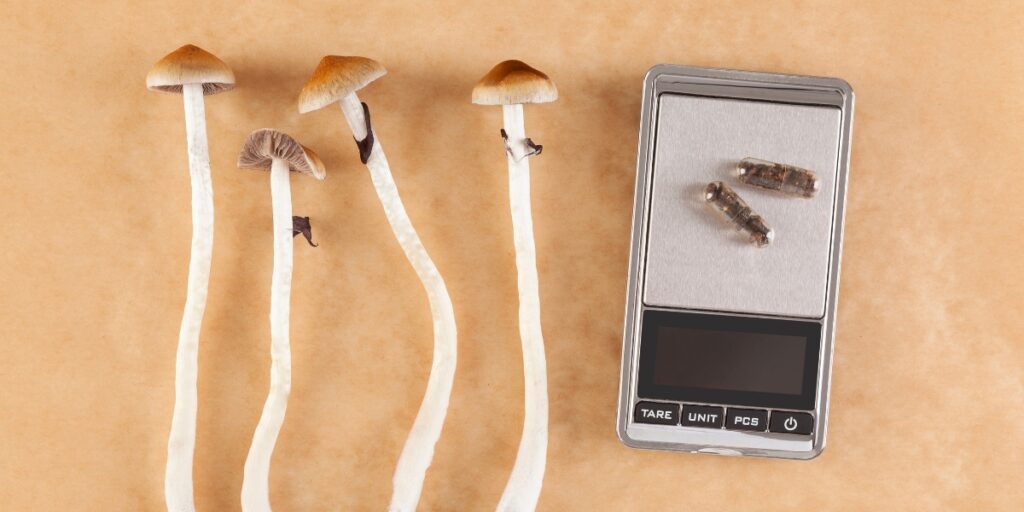Dissociative Drugs

What Are Dissociative Drugs?
Dissociative drugs include any drugs that primarily cause feelings of detachment, distort perceptions of reality, cause hallucinations, or mimic near-death experiences.
The hallucinogenics and dissociative drug classifications include illicit drugs and some that are technically legal. Legal dissociatives are typically FDA-approved for specific medical uses, but recreational drug users and addicts abuse them and take extremely high doses to get the desired effects.
Dissociative drugs’ origins are equally naturally occurring and human-made. Some dissociative drugs like psilocybin (magic mushrooms) and salvia divinorum (salvia) grow naturally and have hundreds of years of history. Other drugs, like phencyclidine (PCP), ketamine, and dextromethorphan (DXM), are more recent and created in labs.
Effects of Dissociative Drugs
The effects of dissociative drugs vary based on the type of drug and the person taking it. People take hallucinogenic and dissociative drugs for mind-altering effects, but they all have physical side effects that can cause long-term complications. The drugs interact with brain chemistry to produce psychological results. However, most of those chemicals also control biological functions, and some are responsible for the dissociative anesthetics mechanisms of action and pain relief.
As with all drugs, high doses of dissociatives will have more potent, longer-lasting trips. Mixing different drugs and alcohol increases the chances of unpredictable effects and dangerous interactions.
Short-Term Effects
Most effects last between a half hour to several hours. However, some users who continue to re-up or unknowingly trigger co-occurring conditions may experience more prolonged effects.
Common short-term effects of dissociative drugs include:
- Numbness
- Rush of euphoria
- Feelings of detachment from your body or surroundings
- Distorted perception of time and space
- Visual, auditory, or tactile sensitivity
- Anxiety
- Paranoia
- Aggression
- Nausea
- Headaches
- Changes in heart rate, body temperature, blood pressure, and breathing
- Confusion
- Memory loss
- Hallucinations
- Exaggerated strength
- Reduced pain response
Long-Term Effects
Many types of dissociative drugs are relatively new, causing the long-term effects to remain largely unknown. Thanks to emerging research and well-documented dissociative drugs like mushrooms, salvia, and PCP, some concerning long-term effects are known.
Long-term dissociative drug effects include:
- Tolerance
- Memory loss
- Cognitive decline
- Paranoia
- Speech difficulties
- Loss of coordination
- Depression
- Worsening mental health
- Drug cravings
- Flashbacks
- Withdrawal
- Protracted withdrawal syndrome
- Violent or suicidal thoughts

Types of Dissociative Drugs and Their Effects
According to the National Institute on Drug Abuse (NIDA), there are two main types of mind-altering drugs— hallucinogenic and dissociative. Classical hallucinogens include substances that make you experience things that don’t exist, like mushrooms, salvia, and PCP. Dissociative drugs cause more disconnected or out-of-body feelings like ketamine, DXM, and nitrous oxide. Most users use the terms interchangeably.
Below are the most popular and common dissociative drugs and their effects.
Ketamine
Ketamine, a.k.a K or Special K, is FDA-approved as a sedative for humans and animals under medical supervision. Currently, there are limited clinical trials using ketamine therapy for depression and post-traumatic stress disorder.
Ketamine’s effects, called a k-hole, are extreme sedation, sometimes even an inability to voluntarily move, and memory loss. Users have described near-death experiences and close to complete sensory detachment after taking high doses of ketamine.
PCP
Phencyclidine (PCP), a.k.a. angel dust or rocket fuel, is one of the most unpredictable drugs on the market. After human trials showed dangerous side effects, it was banned from medical use but still used for animals.
PCP’s effects include vivid hallucinations, reduced or complete lack of response to pain, feelings of super strength, agitation, violent tendencies, memory loss, and muscle spasms or contortions. PCP also causes extreme cravings and intense withdrawal symptoms, causing people to continue seeking it out to avoid getting sick.
Nitrous Oxide
Nitrous oxide, a.k.a. laughing gas or whippits, is used in medical settings as anesthesia, frequently at dentist offices. Recreational drug users inhale it from whip cream cans, or small canisters called chargers.
Inhaling nitrous oxide and other chemicals to get high is called huffing. Nitrous oxide effects include lightheadedness, relaxation, increased amusement, dizziness, and distorted perceptions of your surroundings.
DXM
Dextromethorphan (DXM) is the main ingredient in cough suppressants and prescription cough syrups, sometimes called the “triple Cs” or Coricidin Cough and Cold pills. In small doses, DXM works in the central nervous system to have cough-suppressing effects. Taking high doses of DXM is called robotripping.
People will mix DXM with alcohol and soft drinks to make lean or purple drank. DXM effects are similar to ketamine and include slowed reflexes, drowsiness, memory impairment, and a distorted sense of time and space. Extremely high doses can cause hallucinations.
Salvia
Salvia divinorum, salvia for short, a.k.a. magic mint or diviner’s sage, is a plant from Central and South America with dissociative and psychoactive effects. Many tribal and spiritual rituals use salvia, causing it to have mixed legal status in the United States.
Salvia effects include detachment from reality, increased body awareness, and visual and auditory distortions or hallucinations. High doses cause near-death feelings and feelings of complete separation from your body.
Psilocybin
Psilocybin, known as magic mushrooms or shrooms, grow in parts of the United States, Mexico, and South America. Psilocybin has a history of ceremonial and ritual uses. Currently, limited clinical trials are exploring micro-dosing magic mushrooms for therapeutic use.
Psilocybin effects include mood changes, altered thought patterns, and experiencing sights, sounds, and sensations that do not exist in reality.

Withdrawal Symptoms
Withdrawal symptoms vary based on the type of dissociative drug, length and severity of abuse, and the person’s physical and mental health. Users who are not physically dependent may still experience withdrawal symptoms.
Most withdrawal symptoms are psychological with minor physical side effects; however, drugs like PCP, ketamine, and DXM have intense physical withdrawals.
Common dissociative drug withdrawal symptoms include:
- Headache
- Confusion
- Drug cravings
- Nausea
- Mood swings
- Anxiety
- Depression
- Flashbacks
- Sweating
- Memory impairment
- Speech difficulties
- Delated or reduced reflexes
- Suicidal thoughts
- Intrusive thoughts
Some users will suffer from protracted withdrawal, the persistence of withdrawal symptoms over months or longer. Managing the psychological aspects of withdrawal is as vital as controlling the physical symptoms to avoid self-harm and relapse.
Dissociative Drug Addiction Treatment
Compassionate, evidence-based treatment is available if you or a loved one are struggling with dissociative drug addiction. At Northridge Addiction Treatment Center, we specialize in personalized treatment plans that address your unique needs with a whole-person approach.
We work with you to uncover the roots of your addiction through dual diagnosis and individual therapy. Our goal is to empower you with healthy habits and coping skills to ensure you thrive in long-term recovery.
The path to recovery starts with a phone call. Reach out to us today to begin your journey.
Find Meaningful Recovery
Our caring and compassionate specialists are eager to help you comfortably navigate this journey to recovery. Our individualized treatment plan, programs, and therapies may be a perfect match for you or your loved one. Let us assist you in living the happy life you deserve. It starts with a phone call.




